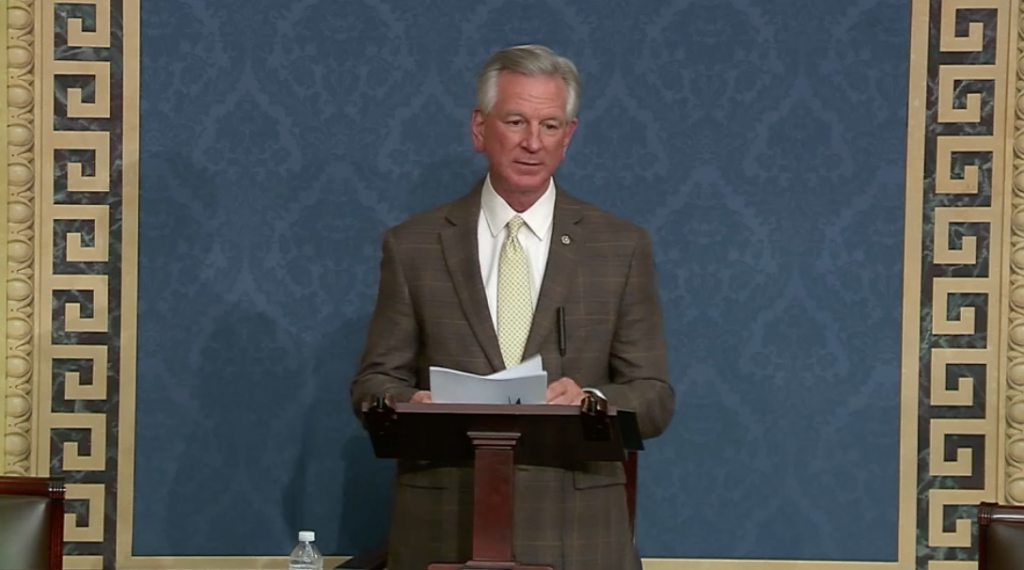Source: United States Senator for Ohio Rob Portman
June 7, 2021 | Press Releases
WASHINGTON, DC – This evening on the Senate floor, U.S. Senator Rob Portman (R-OH) honored the 77th anniversary of D-Day by reading the prayer that President Franklin D. Roosevelt delivered to the nation on the morning of June 6, 1944, now known as the D-Day Prayer.
Portman discussed his work to ensure the prayer is permanently inscribed at the Circle of Remembrance, just north of the World War II Memorial. The World War II Memorial Prayer Act, authored by Senator Portman and Representative Bill Johnson and signed into law in 2014, directs the Secretary of the Interior to install a plaque near the World War II Memorial in Washington, D.C., inscribed with the words of the D-Day Prayer. The legislation requires that the plaque comply with the Commemorative Works Act and prohibits the use of federal funding. A temporary plaque was donated to the Friends of the National World War II Memorial to honor our WWII veterans and their families during the 75th anniversary and was installed in 2019. Construction of the permanent plaque is expected to be completed next year.
A transcript of his remarks can be found below and a video can be found here:
“I’m here on the floor of the Senate this evening to commemorate the 77th anniversary of D-Day. This was a huge turning point in World War II, of course. The invasion of Normandy occurred 77 years ago yesterday. Historian Douglas Brinkley wrote that D-Day was both the single most important moment in the 20th century and one of the most tragic too, in terms of loss of life. I think he was right. 160,000 soldiers crossed the channel that day to begin the campaign to recapture Europe from Hitler’s rule.
“On their backs were rucksacks with 80 pounds of gear. But so, too, was the fate of all of us, our allies in Europe, really the fate of the free world. And many of our best and brightest young Americans did fall that day. We lost more than 10,000 men in one day. The Nazis had spent two years fortifying the coast to prepare for this moment. It was Hitler’s so-called Atlantic wall. The beautiful coastline of northern France was covered in barbed wire, land mines, and bunkers.
“But at the end of the largest amphibious invasion in history, we stood victorious. Battered, but not broken. On we marched through France, through Belgium and finally into Germany itself. But even today, amid the flowers and fields of Normandy – I’ve been there, many of you have been there listening tonight – you can feel even today the lingering presence of those who died that day in the service of liberating Europe. And you can see it in the stark, orderly U.S. military cemeteries, where row after row of white crosses and stars of David commemorate those brave souls who were lost, representing lives lost in a noble cause.
“And though much has happened in the following 77 years, we can never lose sight of the valor and the sacrifice by our armed forces on that one day. On Memorial Day about a week ago, I spoke at the National Veterans Memorial and Museum in Columbus, Ohio. It was a hopeful day for me not just to have so many people together as we emerged from COVID-19, really the first big public event they’ve had, but also to see the generations of veterans and family members there to honor the fallen. World War II veterans, Gulf War veterans, Korean War veterans, the Vietnam veterans, and veterans, of course, from Afghanistan and Iraq.
“They represented the living embodiment of the stories we ought to be remembering from a war that recedes further into the past with every passing year. Stories of valor like that displayed by Jim ‘Peewee’ Martin from Dayton, Ohio. On that day, he and the rest of the 506th Parachute Infantry Regiment parachuted behind German lines in the dark of predawn. Jim was wounded but fought bravely, earning both the Purple Heart and the Bronze Star for his efforts.
“Stories of sacrifice like that of the Napier Brothers of Warren County in southwest Ohio – the county my mom is from. All five of the brothers served in the war and two of the five brothers landed at D-Day. One died there on the beaches, never to return to his Ohio home. They are stories to be preserved for generations to come. The memory of D-Day and indeed of World War II must never be lost.
“Since I’ve been here in the United States Senate, I’ve often come to the floor on D-Day to recite the special prayer that was given that day by Franklin Delano Roosevelt. It was expected, of course, that FDR would give a speech when the invasion took place. One of his fireside chats from the White House. But for some reason, FDR was moved to prayer. The famous prayer that he gave that day has become known as the D-Day prayer. It is a powerful statement, my favorite presidential statement, and one that deserves to be remembered for generations to come. In 2013, I introduced legislation called the World War II Memorial Prayer Act, which directs the Secretary of Interior to install a plaque to be placed at the World War II Memorial on the National Mall with the words of the D-Day prayer.
“It’s a beautiful memorial, but frankly, some more interpretation wouldn’t be a bad thing. And having that prayer there, as you’ll see in a moment when we recite it, would be an appropriate way to pay tribute to those who lost their lives that day. It was Ohio Christian Alliance President Chris Long who first came to me with the idea of a plaque displaying this historic prayer. That legislation was actually signed into law with the help of Senator Joe Lieberman on a bipartisan basis. We got it passed in 2014.
“The Friends of the National World War II Memorial and the National Park Service have since that time worked with us to develop and refine the final permanent plaque design. Most recently, they received design approvals from the Commission of Fine Arts and the National Capital Planning Commission. It takes a while to get things done on the National Mall I found. There is quite a process. It has now been seven years, longer than World War II itself, and despite the hurdles, we have yet to see the final plaque installed. But it will be done, by the way, not at any cost to the taxpayers, meaning private fundraising, no taxpayer dollars, will be used.
“We had hoped to have the final plaque in place for the 75th anniversary. In the meantime, in 2019, we were able to have a temporary plaque in place with the words of the prayer at the permanent location for the permanent plaque, which is at the Circle of Remembrance next to the World War II memorial.
“If you’re on the Mall and you’re coming from the Capitol, it’ll be on your right. So it is north of the World War II Memorial, but right next to it. And in this very beautiful place, the Circle of Remembrance, a good place to sit and reflect, you will see right now, the plaque is there and you can read the prayer. The permanent plaque will be even bigger and will allow even more people to have access to it. I encourage people to go see that plaque. By the way, I think it’s the only prayer on display on our National Mall.
“The temporary plaque, by the way, was generously donated by the friends of the National World War II Memorial. We’re very hopeful that the permanent plaque will be placed at the Circle next year. I want to thank the Lilly Endowment for their generous support of this project, by the way. Last October, they provided a $2 million grant for the construction and installation of the permanent plaque. And this committed financial support will be critical to finally bringing the project across the line.
“The fact that a prayer was offered that day by our commander-in-chief is historic in and of itself. But it’s the content of the prayer that makes it so worthy of remembrance. I’d now like to read this World War II D-Day prayer, if I may.
“‘My fellow Americans,’ FDR began. ‘Last night, when I spoke with you about the fall of Rome, I knew at that moment that troops of the United States and our allies were crossing the Channel in another and greater operation. It has come to pass with success thus far.
“‘And so, in this poignant hour, I ask you to join with me in prayer:
“‘Almighty God: Our sons, pride of our Nation, this day have set upon a mighty endeavor, a struggle to preserve our Republic, our religion, and our civilization, and to set free a suffering humanity. Lead them straight and true; give strength to their arms, stoutness to their hearts, steadfastness in their faith.
“‘They will need Thy blessings. Their road will be long and hard. For the enemy is strong. He may hurl back our forces. Success may not come with rushing speed, but we shall return again and again; and we know that by Thy grace, and by the righteousness of our cause, our sons will triumph.
“‘They will be sore tried, by night and by day, without rest-until the victory is won. The darkness will be rent by noise and flame. Men’s souls will be shaken with the violences of war. For these men are lately drawn from the ways of peace. They fight not for the lust of conquest. They fight to end conquest. They fight to liberate. They fight to let justice arise, and tolerance and good will among all Thy people. They yearn but for the end of battle, for their return to the haven of home.
“‘Some will never return. Embrace these, Father, and receive them, Thy heroic servants, into Thy kingdom. And for us at home — fathers, mothers, children, wives, sisters, and brothers of brave men overseas — whose thoughts and prayers are ever with them–help us, Almighty God, to rededicate ourselves in renewed faith in Thee in this hour of great sacrifice.
“‘Many people have urged that I call the Nation into a single day of special prayer. But because the road is long and the desire is great, I ask that our people devote themselves in a continuance of prayer. As we rise to each new day, and again when each day is spent, let words of prayer be on our lips, invoking Thy help to our efforts.
“‘Give us strength, too — strength in our daily tasks, to redouble the contributions we make in the physical and the material support of our armed forces. And let our hearts be stout, to wait out the long travail, to bear sorrows that may come, to impart our courage unto our sons wheresoever they may be.
“‘And, O Lord, give us Faith. Give us Faith in Thee; Faith in our sons; Faith in each other; Faith in our united crusade. Let not the keenness of our spirit ever be dulled. Let not the impacts of temporary events, of temporal matters of but fleeting moment let not these deter us in our unconquerable purpose.
“‘With Thy blessing, we shall prevail over the unholy forces of our enemy. Help us to conquer the apostles of greed and racial arrogancies. Lead us to the saving of our country, and with our sister Nations into a world unity that will spell a sure peace, a peace invulnerable to the schemings of unworthy men. And a peace that will let all of men live in freedom, reaping the just rewards of their honest toil.
“‘Thy will be done, Almighty God. Amen.’
“Powerful prayer. I love the part about ‘they come not to conquer, they come to liberate.’ The same can be said for our armed forces throughout the ages. I look forward to seeing these words of prayer permanently displayed on the National Mall to help us memorialize such a noble day we must never forget. I yield the floor.”
###






